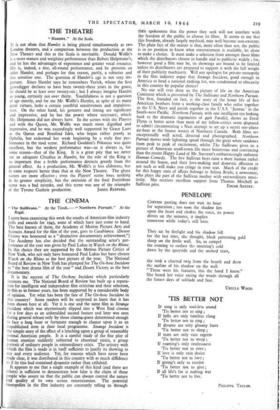THE CINEMA
I HAVE been examining this week the results of American film industry polls and awards for 1943, some of which have just come to hand. The best known of them, the Academy of Motion Picture Arts and Sciences Award for the film of the year, goes to Casablanca. (Desert Victory was honoured as a "distinctive documentary achievement.") The Academy has also decided that the outstanding actor's per- formance of the year was given by Paul Lukas in Watch on the Rhine. In this choice they are supported by the Motion Picture Critics of New York, who not only have honoured Paul Lukas but have chosen Watch on the Rhine as the best picture of the year. The National Board of Review in New York has plumped for The Ox-bow Incident as "the best drama film of the year" and Desert Victory as the best documentary. It is the success of The Ox-bow Incident which particularly interests me. The National Board of Review has built up a reputa- tion for intelligent and independent film criticism and their selection, in this as in former years, has been supported by a considerable body of opinion. Yet what has been the fate of The Ox-bow Incident in this country? Some readers will be surprised to learn that it has been shown here at all. Yet it is one and the same film as Strange Incident which was mysteriously slipped into a West End cinema for a few days as an unheralded second feature and later was seen during general release only by those cinerna-goers determined enough to face a long hunt or fortunate enough to chance upon it as an unpublicised item in their local programme. Strange Incident is the simple story of the effect of a lynching upon a group of reasonably normal American people. It is a careful study of the fine play of human emotion suddenly subjected to abnormal strain, a group Portrait of ordinary people in extraordinary crisis. The artistry with which the film is made is in itself sufficient to justify its showing to any and every audience. Yet, for reasons which have never been made clear, it was distributed in this country with as much diffidence as if its tins had contained dynamite rather than celluloid.
It appears to me that a single example of this kind (and there are others) is sufficient to demonstrate how false is the claim of those people who assure us that the public can always control the nature and quality of its own screen entertainment. The potential monopolies in the film industry are constantly telling us through
their spokesmen that the power they seek will not interfere with the freedom of the public to choose its films. It seems to me that this freedom, already largely mythical, may well become non-existent. The plain fact of the matter is that, more often than not, the public is in no position to know what entertainment is available, let alone to make a choice. It must make a selection from amongst those films which the distributors choose to handle and to publicise widely ; for, however good a film may be, its showings are bound to be limited unless its distributors are prepared to support it with the full weight of their publicity machinery. Will any apologist for private monopoly in the film industry argue that Strange Incident, good enough in America to head a national ranking list, was condemned to obscurity in this country by popular choice?
No one will ever deny us the picture of life on the American Continent which is presented by The Sullivans and Northern Pursuit. The first, founded on fact, is the story of the home life of five American brothers from a working-class family who enlist together in the U.S. Navy and perish together in the U.S.S. 'Juneau' in the South-west Pacific. Northern Pursuit, with one intelligent eye looking back to the dramatic ingenuities of 49th Parallel, shows us Errol Flynn (a better actor than most of my fellow-critics seem disposed to admit) circumventing a Nazi attempt to set up a secret one-plane air-base in the frozen wastes of Northern Canada. Both films are exceptionally well acted, directed and photographed. Northern Pursuit moves with lightning speed through the great white outdoors from peak to peak of excitement, whilst The Sullivans gives us a picture of American small-town life more boisterous and convincing than the recent Happy Land of Mr. Saroyan's embarrassingly unfunny Human Comedy. The five Sullivan boys raise a most human racket around the house, and their love-making and domestic affection is not such as will make you cringe in your seat. Much of the credit for this happy state of affairs belongs to Selena Royle, a newcomer, who plays the part of the Sullivan mother with extraordinary sensi- tivity. She receives excellent support from Thomas Mitchell as


























 Previous page
Previous page